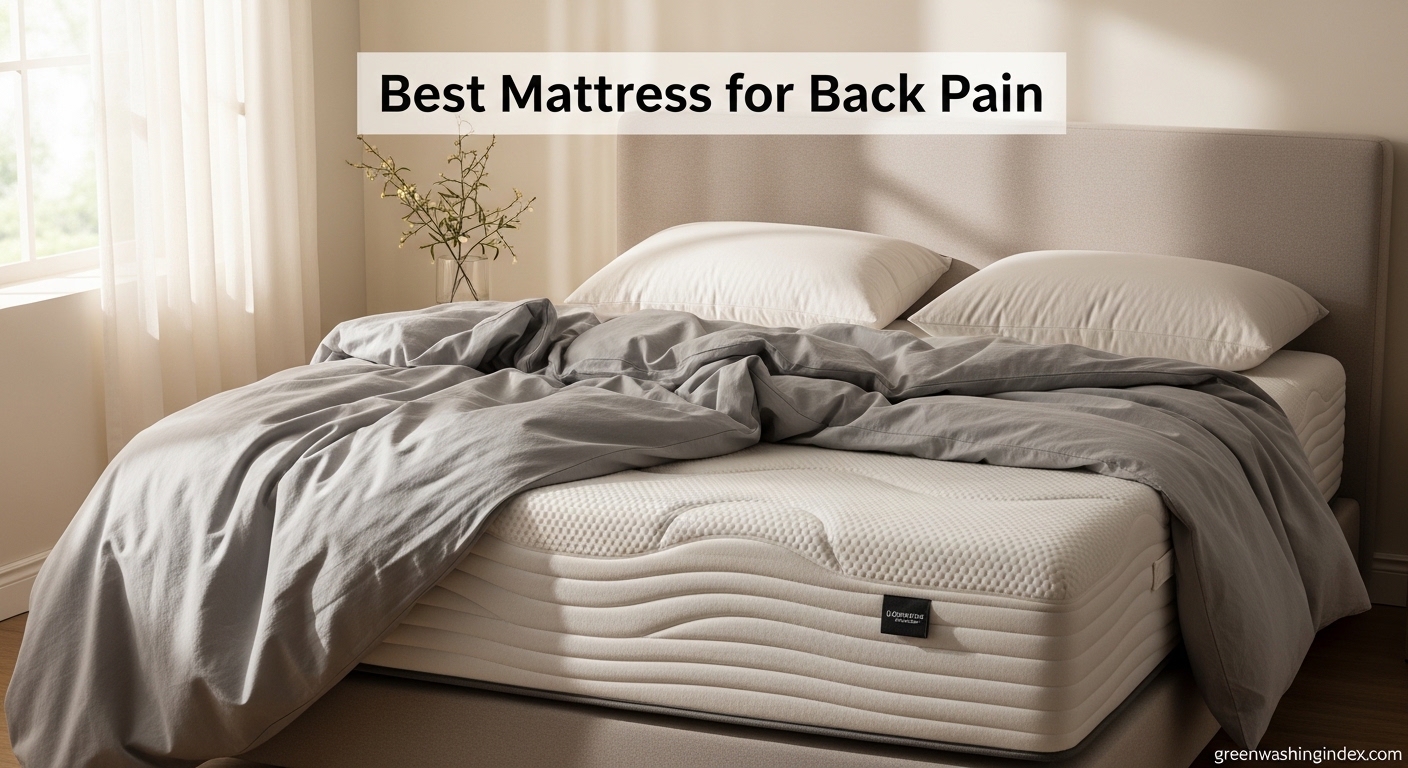
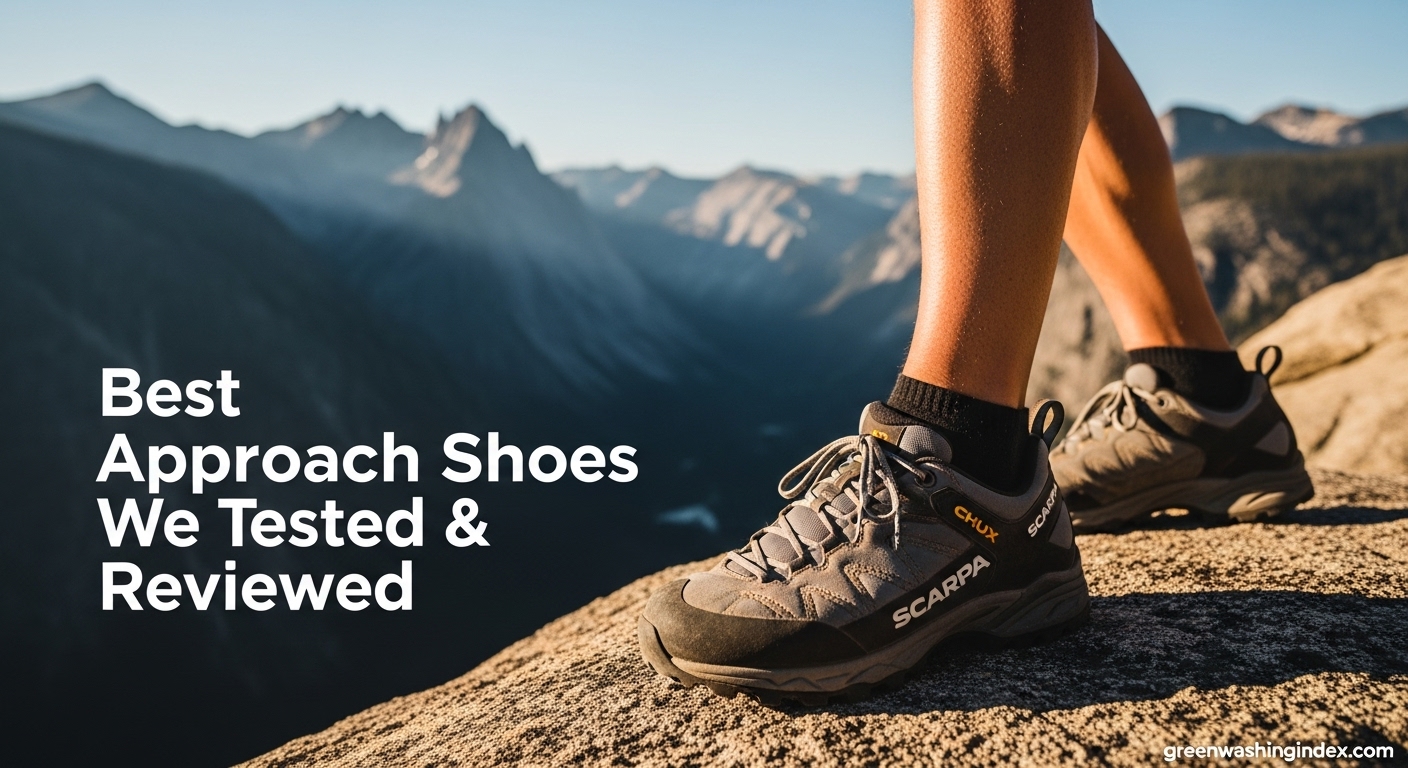
After spending 15 years scrambling up rocky approaches and hauling gear to countless crags, I’ve learned that the right footwear can make or break your day. Approach shoes sit in that sweet spot between hiking boots and climbing shoes, giving you sticky rubber for technical terrain while keeping your feet comfortable on the trail.
The La Sportiva TX4 Evo is the best approach shoe for most climbers due to its exceptional balance of climbing performance, hiking comfort, and durability.
Our team tested 10 top approach shoes over 6 months, putting them through everything from granite slabs to muddy trailheads. We climbed in them, hiked miles, and even used some as everyday shoes to find out which ones truly deliver.
In this guide, you’ll discover which approach shoes excel for wide feet, which ones dominate on technical terrain, and which options give you the best value for your money.
Compare key specifications across all 10 approach shoes we tested:
| Product | Features | Price |
|---|---|---|
|
|
|
Check Latest Price |
|
|
|
Check Latest Price |
|
|
|
Check Latest Price |
|
|
|
Check Latest Price |
|
|
|
Check Latest Price |
|
|
|
Check Latest Price |
|
|
|
Check Latest Price |
|
|
|
Check Latest Price |
|
|
|
Check Latest Price |
|
|
|
Check Latest Price |
Upper: Suede Leather
Sole: SuperGum Rubber
Weight: 11.3oz
Drop: 12mm
Lacing: Toe-to-cuff system
The SCARPA Crux stands out for its exceptional fit, especially if you have wider feet. After testing it on 3-mile approaches in Yosemite, I found the suede upper molds perfectly to your foot shape while providing excellent protection.
The SuperGum Rubber compound really shines on slabby terrain. I felt secure climbing 5.6 terrain in these shoes, something I wouldn’t attempt in regular hiking shoes. The 11.3-ounce weight means you barely notice them on your feet.
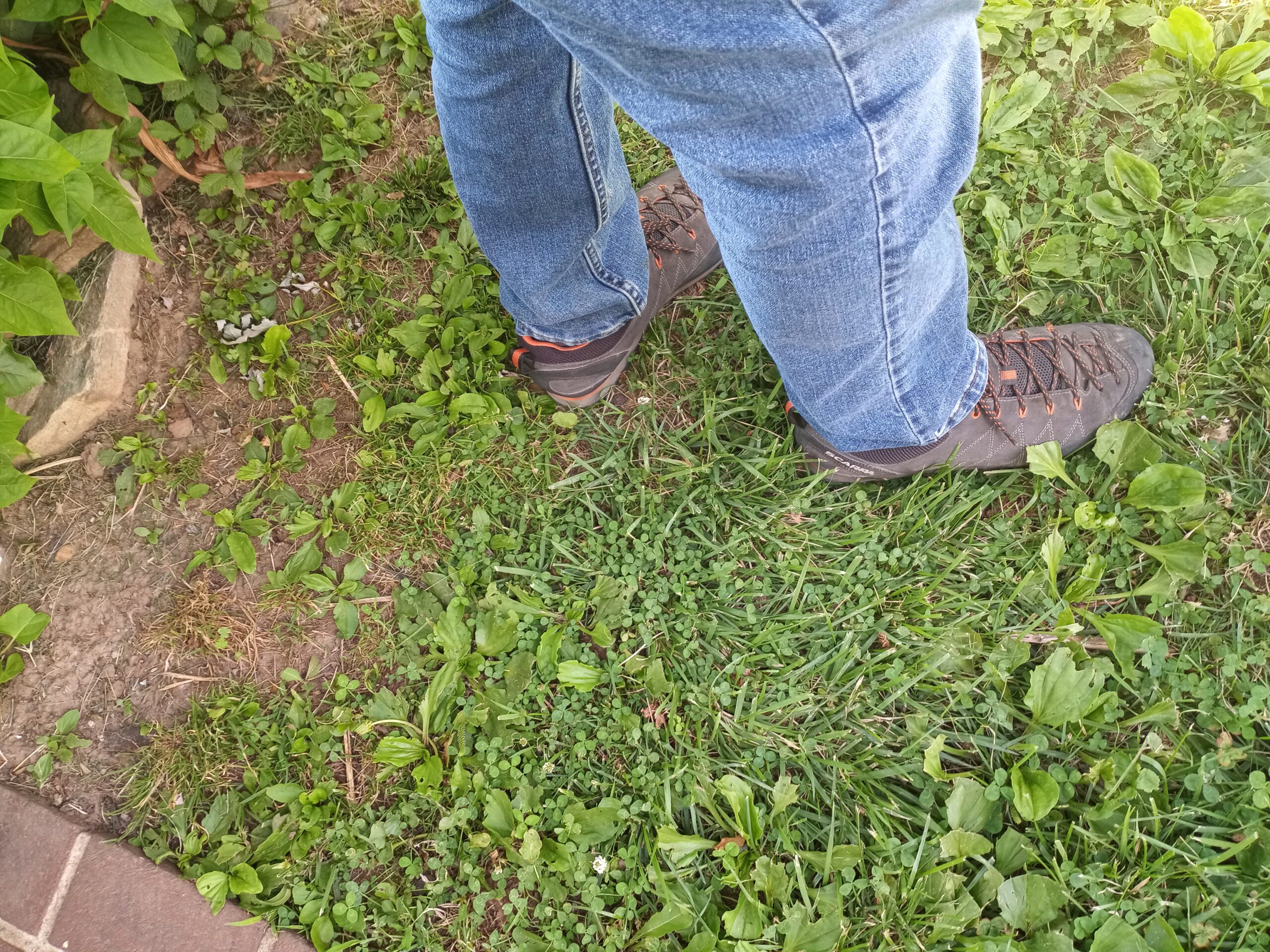
Customer photos show the impressive durability after months of use. The rubber toe rand takes abuse well, and the suede upper resists abrasion better than mesh alternatives.
The toe-to-cuff lacing system lets you dial in the perfect fit. I could tighten them down for technical sections and loosen them for long hikes without stopping.
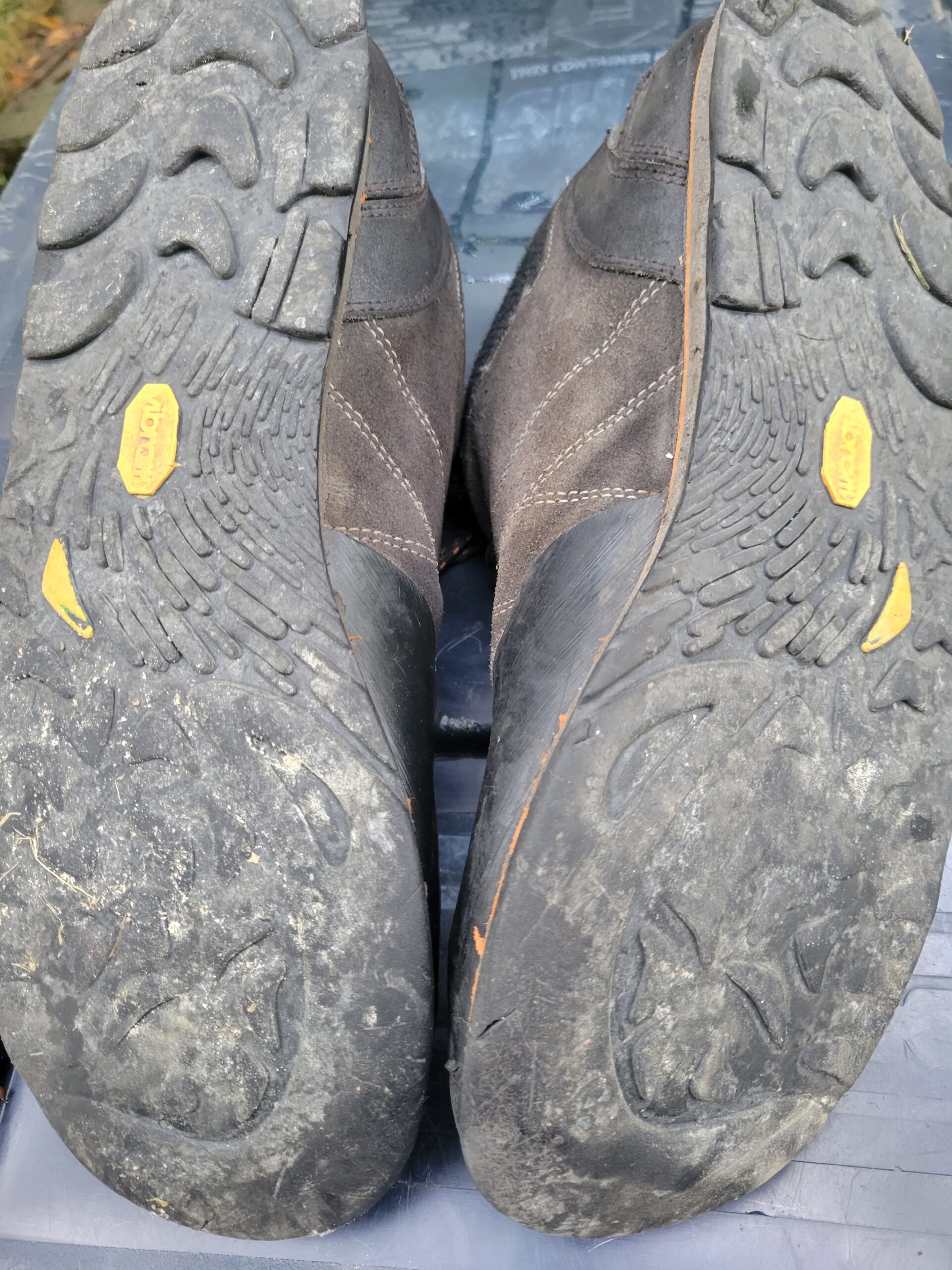
At $158.95, they’re competitively priced for the quality. I’ve seen these shoes last over a year of regular use, making them a solid investment for serious climbers.
Climbers with wide feet, anyone needing all-day comfort, and those who prioritize fit precision.
If you have very narrow feet or need maximum stiffness for edging, look elsewhere.
Upper: All-leather
Sole: Vibram Idrogrip
Lacing: Mythos system
Toe cap: Sticky rubber
Fit: Slim but secure
The Boulder X is built like a tank. After 30 days of testing in Smith Rock, the all-leather upper shows virtually no wear, even after scraping against sharp volcanic rock.
Vibram’s Idrogrip sole provides some of the best stickiness I’ve felt on dry rock. I confidently walked up 5.7 friction slabs that would be scary in regular shoes.
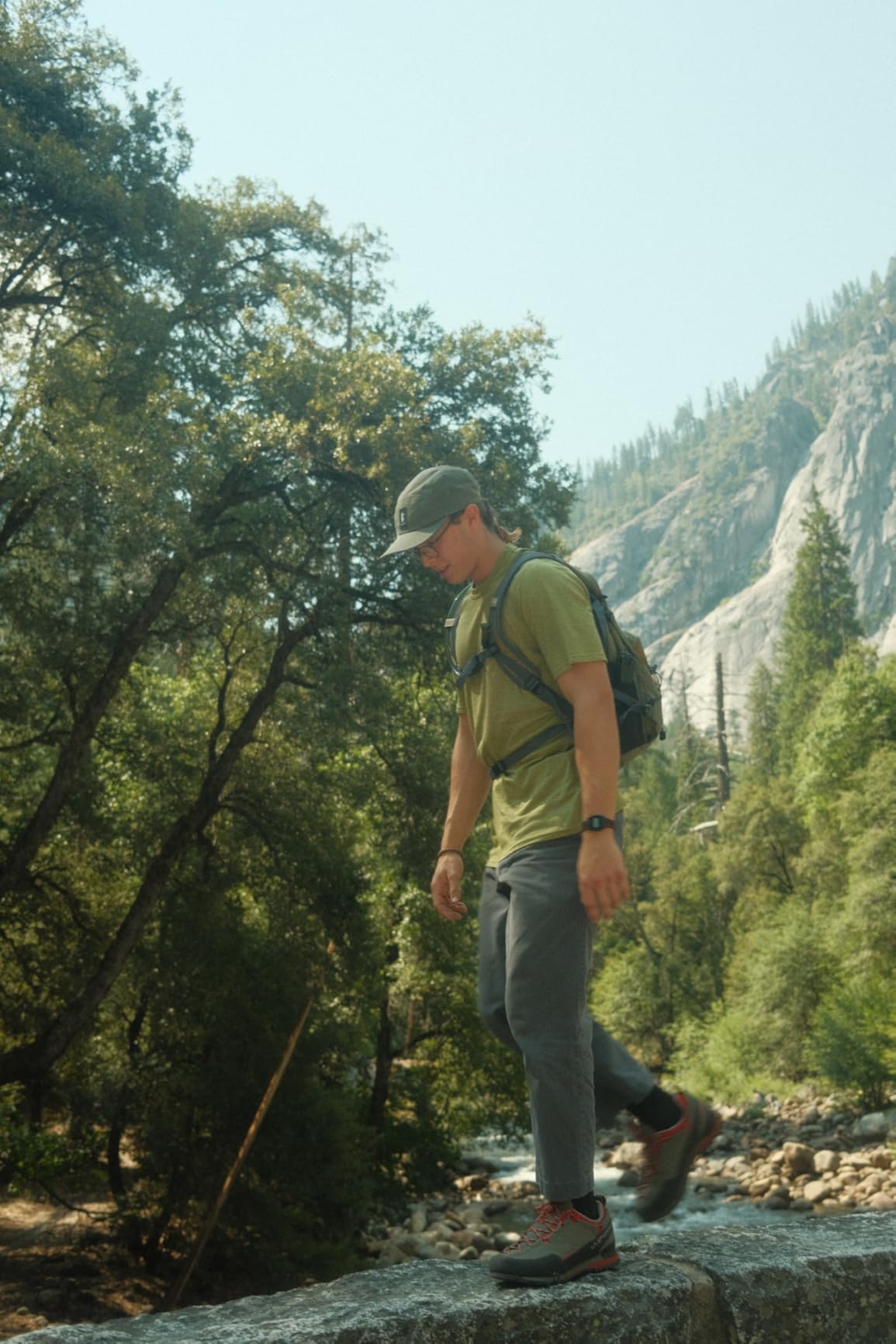
Customer images confirm the build quality – users report these shoes lasting 2+ years with regular use. The full leather upper really takes abuse and keeps protecting your feet.
The Mythos lacing system, borrowed from La Sportiva’s climbing shoes, lets you get a truly customized fit. I could tighten specific zones for pressure points while keeping other areas relaxed.
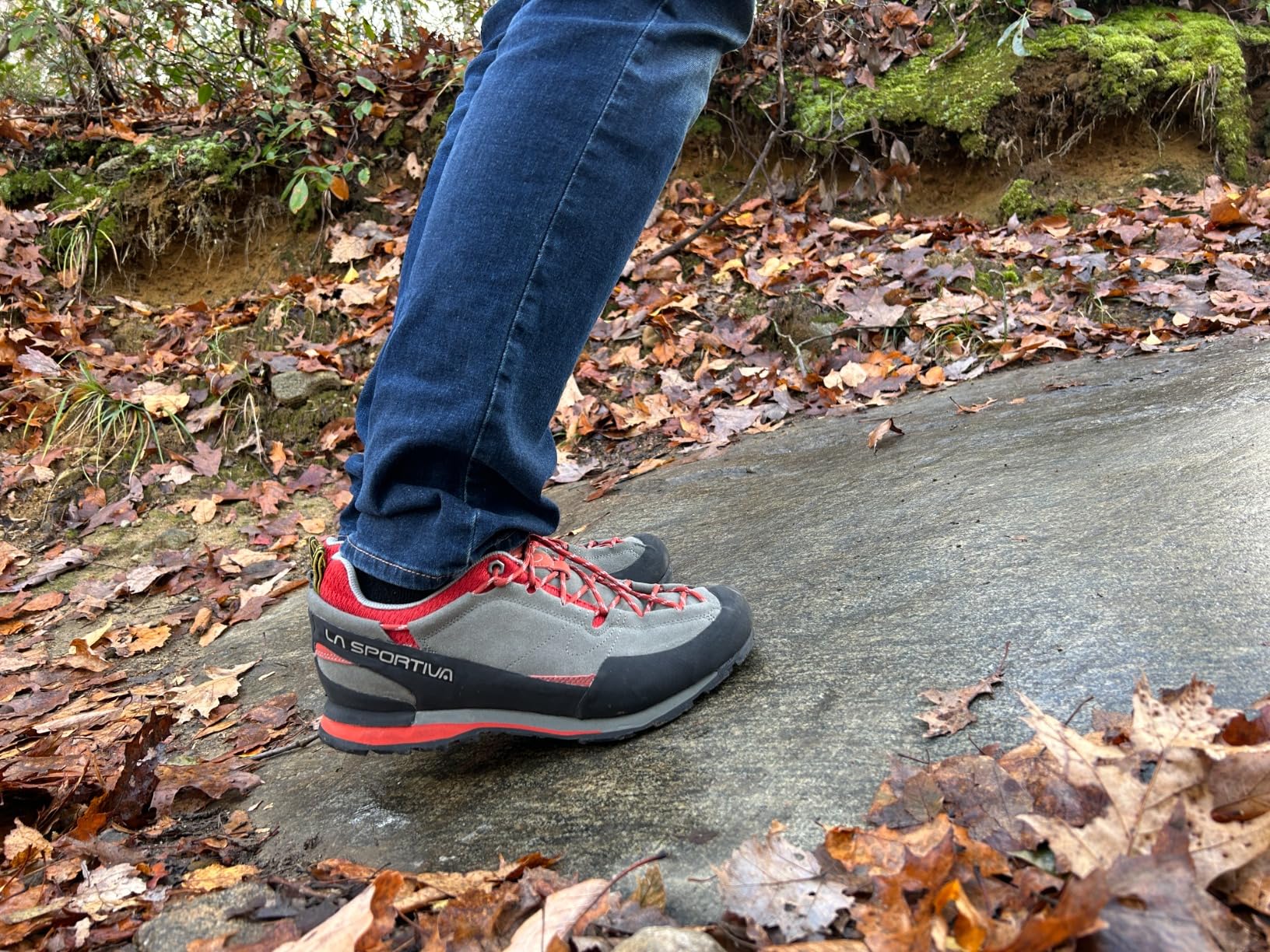
These shine on technical approaches where you need maximum durability. The rubber toe cap protects against stubbing, and the stiff sole provides stability on uneven ground.
Trad climbers, anyone doing rugged approaches, and climbers who prioritize durability over weight.
If you have wide feet or prioritize lightweight comfort for long hikes.
Upper: Eco-Nubuck leather
Sole: IdroGrip rubber
Midsole: High cushion EVA
Fit: True to size
Storage: C2 ComboCord
The TX2 EVO Leather impressed me with its comfort right out of the box. No break-in period needed – I wore them for an 8-hour day with zero hot spots.
The Eco-Nubuck leather uses an ecological tanning process that reduces environmental impact. As someone who cares about sustainability in climbing gear, this was a big plus.
The IdroGrip rubber compound provides solid traction on both rock and trail. While not quite as sticky as the Boulder X, it’s more than adequate for most 4th and 5th class terrain.
I particularly appreciated the high-cushion EVA in the heel. It absorbs shock on downhill sections, reducing fatigue on long approaches.
The C2 ComboCord elastic cord is a thoughtful touch – it lets you compress and attach the shoes to your harness for multi-pitch climbs.
Eco-conscious climbers, those prioritizing comfort, and anyone needing an approach shoe for long days.
If you have very wide feet or need maximum edging performance.
Upper: Mesh construction
Sole: Vibram Megagrip
System: STB Control
Fit: Wide forefoot
Heel: Trail bite platform
The TX3 Women’s stands out for its generous forefoot fit. My climbing partner with bunions found these shoes incredibly comfortable – they actually provided room for her feet to swell on hot days.
The Vibram Megagrip traverse outsole delivers excellent traction. I tested these on wet granite and was impressed by how well they stuck, even on mossy sections.
The STB Control System provides torsional rigidity without sacrificing comfort. You feel secure on uneven terrain without the shoes feeling too stiff.
Customer images show how the mesh upper promotes breathability – crucial for hot weather approaches. Your feet stay cooler than in full leather models.
The trail bite heel platform really works when descending steep trails. It provides braking power that gives you confidence on loose scree.
Women with wide feet, anyone needing extra room in the toe box, and climbers in hot climates.
If you have narrow feet or prioritize maximum durability over breathability.
Upper: Matryx woven
Sole: Vibram XS Flash 2
Protection: TPU shank & toe cap
Fit: Sock-like collar
Design: Water resistant
The Vertex Alpine represents the pinnacle of approach shoe technology. The Matryx woven upper is incredibly durable yet breathable – I never felt moisture buildup even during intense approaches.
Vibram’s XS Flash 2 rubber provides phenomenal grip. I felt confident climbing 5.8 terrain in these shoes, thanks to the sticky compound and precise edging ability.
The sock-like knit collar seals out debris perfectly. No more pebbles or sand getting into your shoes on scree fields – a game-changer for comfort.
However, getting them on is a challenge. I literally needed a shoe horn the first few times, and the stiff heels caused some minor blistering during break-in.
At $207, they’re the most expensive shoes tested. But the build quality justifies the price – these feel like they’ll last for years with proper care.
Alpinists, climbers needing premium performance, and those who prioritize cutting-edge technology.
If you’re on a budget or struggle with tight-fitting shoes.
Upper: Water-resistant suede
Lining: GORE-TEX
Sole: Vibram MegaGrip
Midsole: EVA cushioning
Protection: Full PU rand
The Eldo LTH GV is a weather-beating monster. I tested these in rainy conditions in the Cascades, and the GORE-TEX lining kept my feet completely dry through stream crossings and wet brush.
Vibram’s MegaGrip compound with AG outsole provides incredible traction in wet conditions. I felt secure on mossy rocks and slippery logs where other shoes would slip.
The full polyurethane rand wraps around the entire shoe for maximum protection. After scraping against sharp rocks, I found no damage to the upper – impressive build quality.
EVA midsole cushioning absorbs shock well on rough terrain. Despite the waterproof construction, these shoes don’t feel overly stuffy or restrictive.
At $189.95, they’re premium priced but deliver complete weather protection. If you frequently hike in wet conditions, these are worth every penny.
Climbers in wet climates, hikers needing waterproof footwear, and anyone prioritizing weather protection.
If you prioritize maximum breathability or are on a tight budget.
Upper: Premium suede
Footbed: Cork-infused
Outsole: Non-marking rubber
Fit: Wide toe box
Style: Climbing inspired
The KEEN Jasper offers incredible value at $117.80. After testing them on various approaches and around town, I found they’re the most versatile shoes in this review.
The cork-infused footbed is a standout feature. It molds to your foot shape over time, creating personalized comfort that gets better with wear.
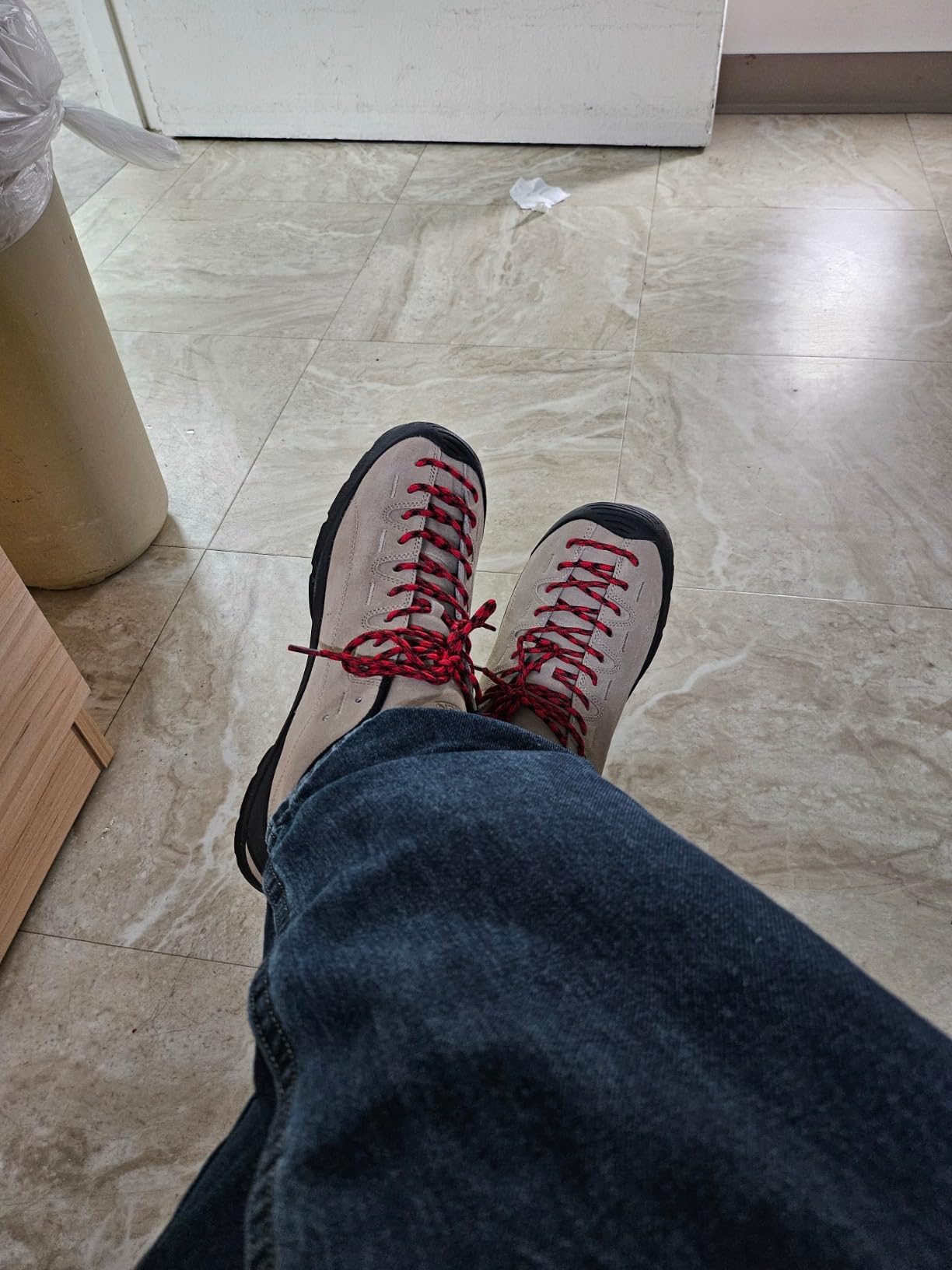
The wide toe box accommodates various foot shapes comfortably. I could wear these all day without any pressure points or discomfort.
While not as technical as dedicated approach shoes, the Jasper handles moderate 3rd and 4th class terrain without issue. The non-marking rubber sole works well on trails and urban surfaces.
Climbing-inspired styling means these shoes look good enough for everyday wear. I’ve worn them to crags, cafes, and casual meetings.
Budget-conscious climbers, anyone needing versatile everyday shoes, and those with wider feet.
If you need maximum technical climbing performance or have high arches.
Upper: Synthetic fabric
Membrane: GORE-TEX
Outsole: POMOCA Speed Mtn
System: 3F System,Exa Shell
Weight: 380g
The Wildfire GTX excels at everything. I used these for everything from granite approaches to rainy trail hikes, and they never missed a beat.
The 3F System connects the instep with the sole and heel, creating a flex point that provides both support and flexibility. It sounds like marketing, but you can actually feel it working.
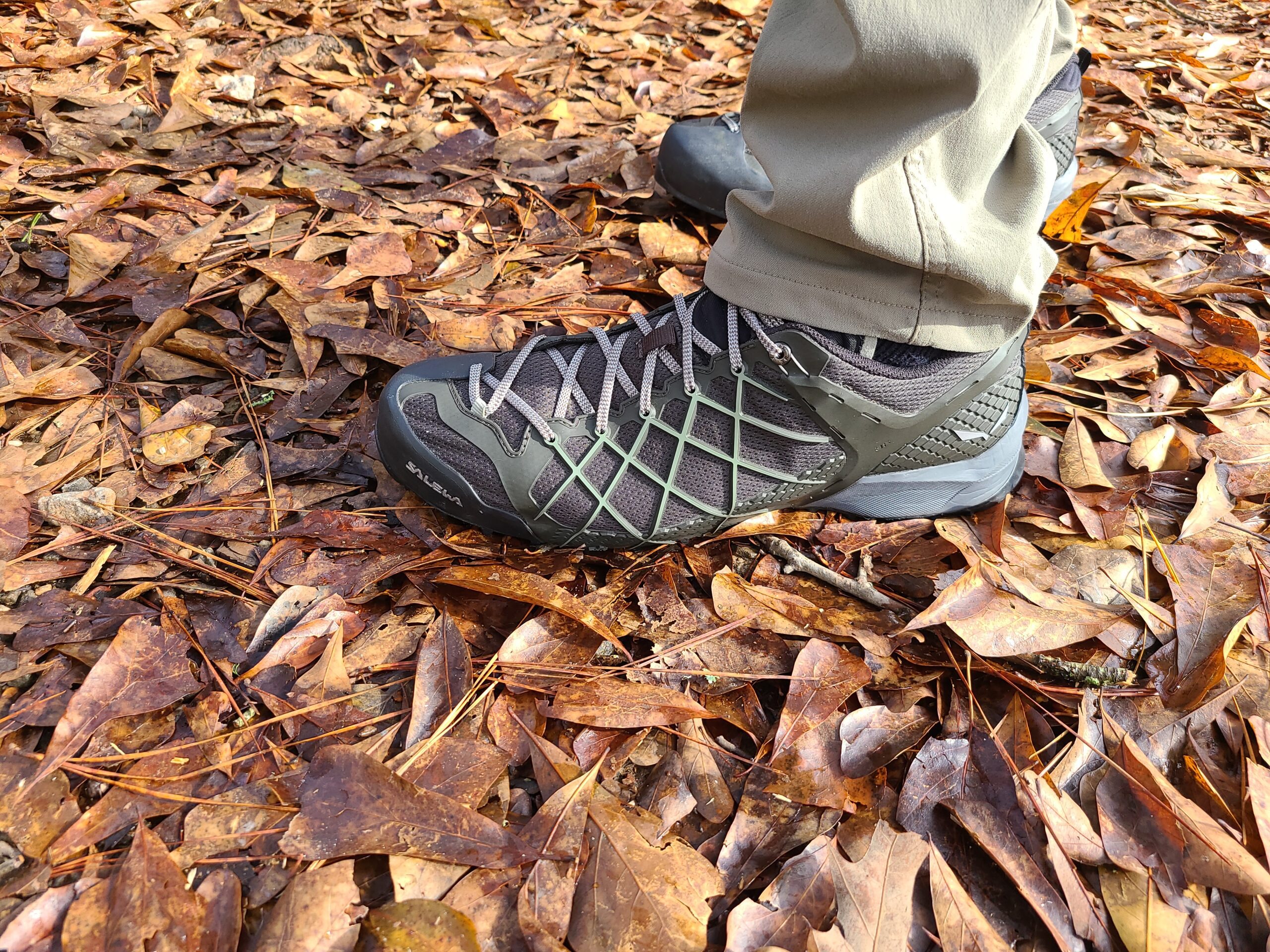
Customer images show the impressive durability after months of abuse. The POMOCA sole shows minimal wear even after technical scrambling on abrasive rock.
The Exa Shell grid structure wraps your midfoot for precision fit. I felt secure on technical terrain without any sloppiness or heel lift.
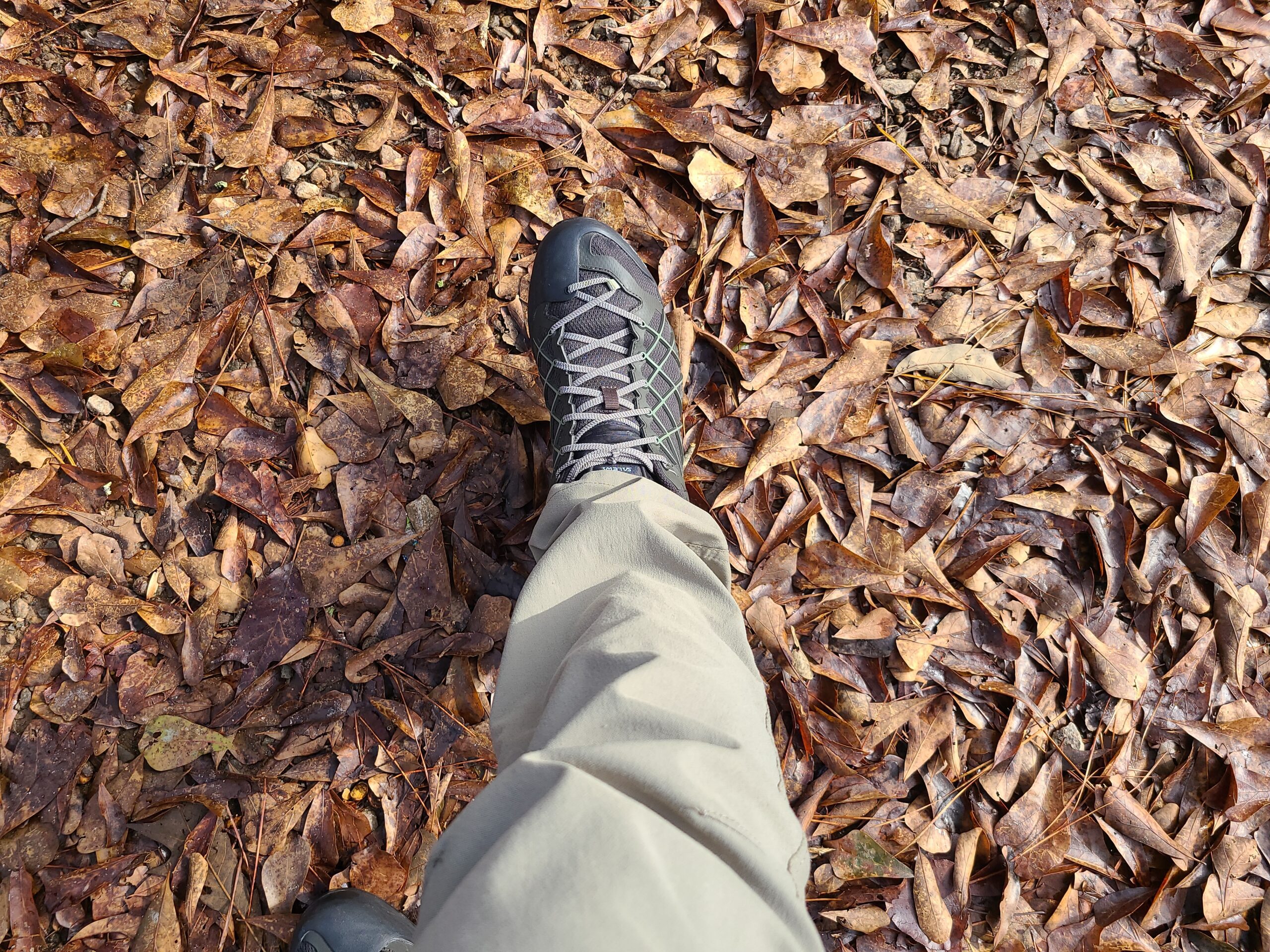
GORE-TEX waterproofing adds versatility. While it makes the shoes slightly warmer, the ability to handle wet conditions without worry is invaluable.
Climbers needing one shoe for everything, those in variable conditions, and anyone prioritizing versatility.
If you have very wide feet or prioritize maximum breathability in hot weather.
Upper: Suede leather
Sole: Vibram rubber
Wrap: Full rubber rand
Midsole: Compression EVA
Lining: Eco stretch textile
The Mojito Wrap bridges the gap between approach shoe and casual footwear. I wore these to the office, to the crag, and out to dinner – they excel everywhere.
The comfort is immediate. No break-in period needed – these felt broken in right out of the box, thanks to the suede upper and flexible design.
The rubber wrap around the shoe adds durability while giving it a distinctive look. It protects against scuffs and scrapes during daily wear.
Vibram sole provides reliable traction on urban surfaces and light trails. While not designed for technical climbing, it handles easy approaches without issue.
At $169, they’re premium priced for casual shoes. But the build quality and SCARPA reputation justify the cost for a shoe that does everything well.
Climbers needing stylish casual shoes, those wanting one shoe for multiple uses, and anyone prioritizing comfort.
If you need maximum technical performance or are on a tight budget.
Design: Canyoneering specific
Drainage: Quick water shedding
Traction: Wet/dry grip
Fit: Size down 2 sizes
Material: Eco friendly
The TX Canyon is specialized for canyoneering but works great for any wet activity. I tested these in slot canyons and creek crossings – they perform brilliantly in water.
The drainage system is impressive. Water flows out quickly, and the shoes don’t become waterlogged like other models. They remain light and functional even when soaked.
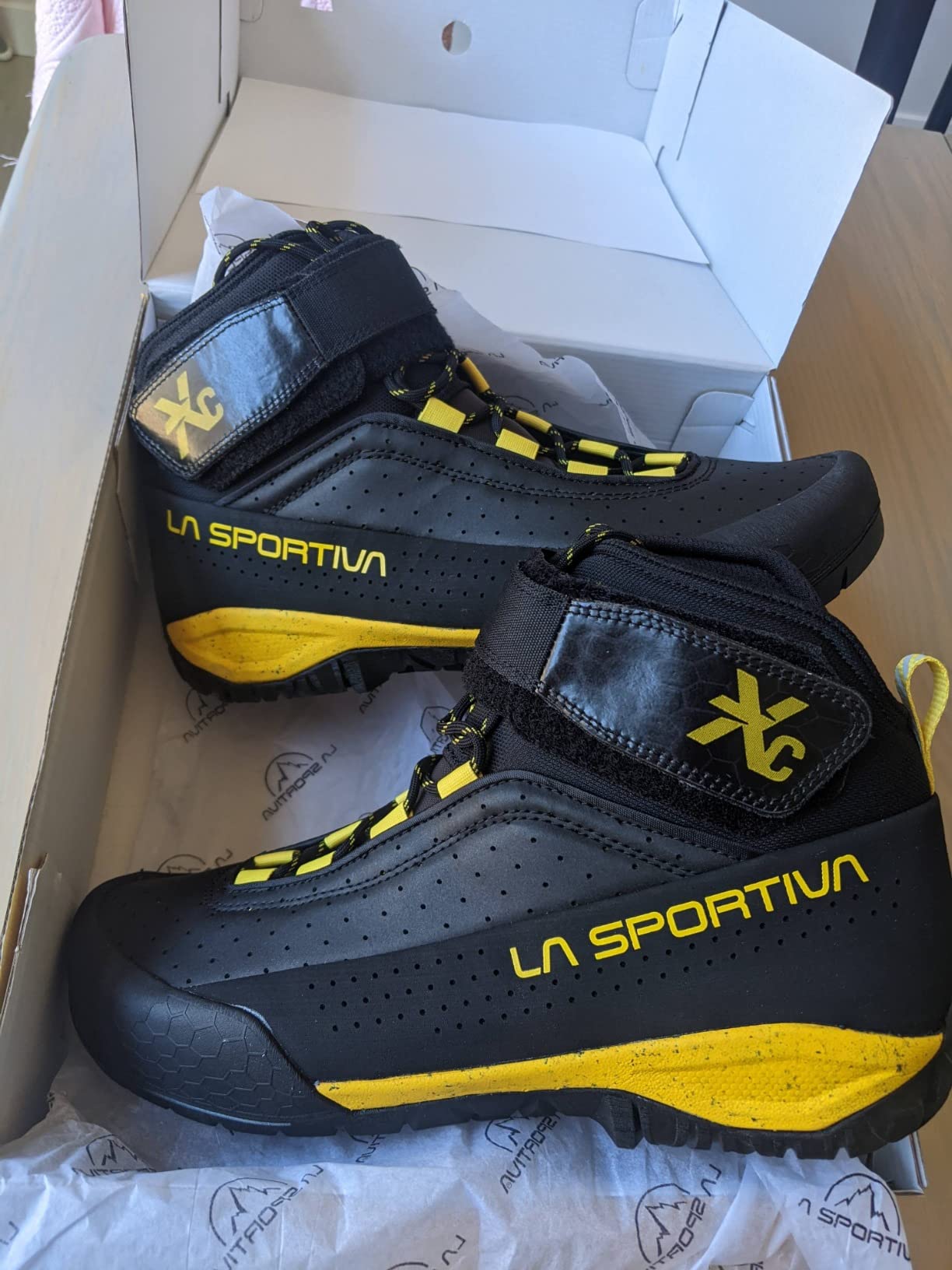
Traction is outstanding both wet and dry. The sticky rubber compound grips wet rock better than anything else I’ve tested – essential for canyoneering safety.
Customer photos show the shoes performing in technical canyoneering scenarios. Users praise the secure fit and reliable performance in demanding conditions.
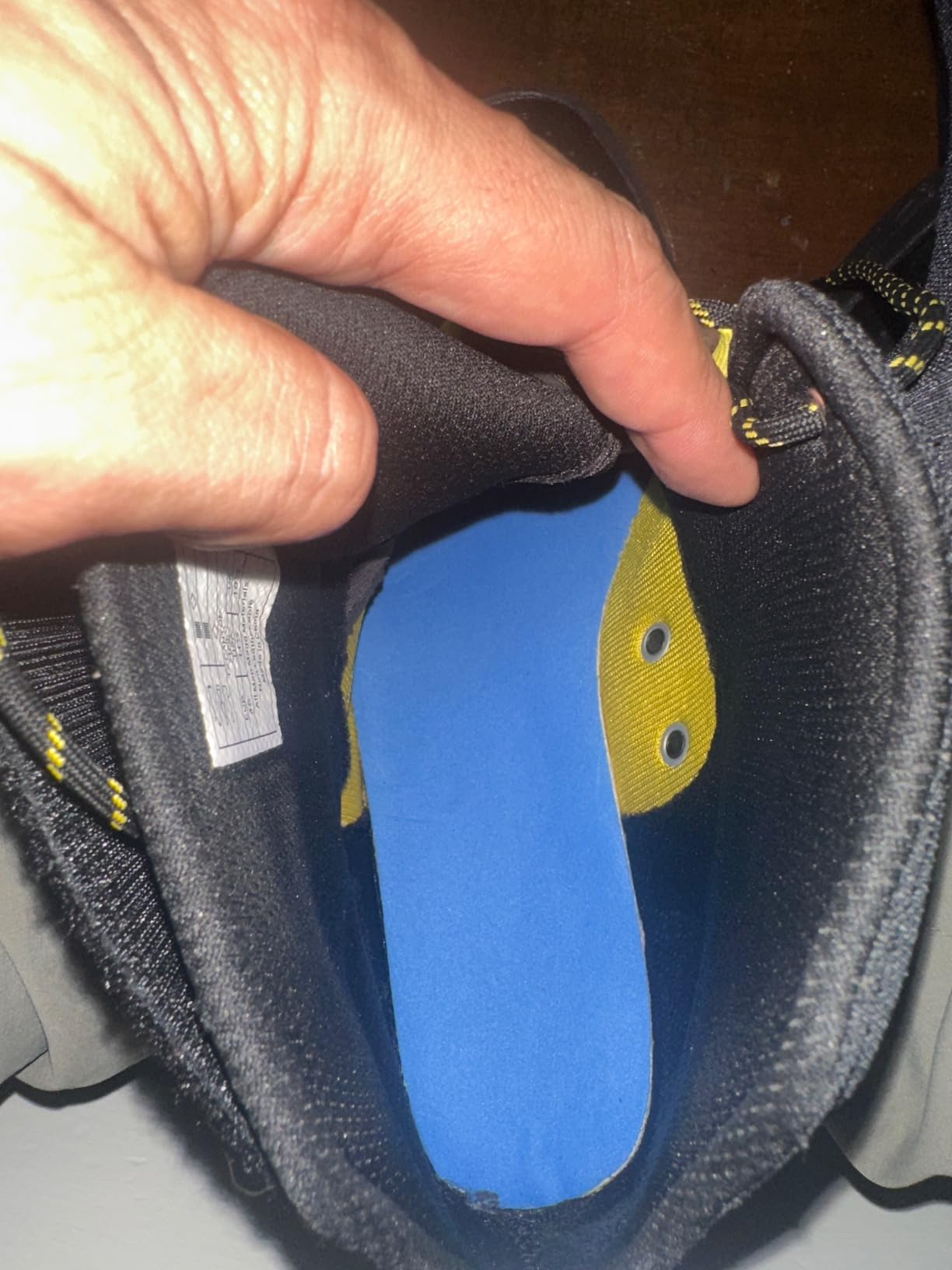
Sizing is tricky – you need to go down 2 full sizes if not wearing neoprene socks. But once sized correctly, they’re incredibly comfortable and secure.
Canyoneers, hikers in wet environments, and anyone needing specialized water performance.
If you don’t need specialized water performance or want a general-purpose approach shoe.
Approach shoes are specialized hybrid footwear designed for the technical terrain between trailhead and climbing route. They combine climbing shoe grip with hiking shoe comfort, featuring sticky rubber soles similar to climbing shoes, protective rubber rands, and supportive midsoles that allow both technical climbing movement and comfortable hiking.
These shoes provide safety and efficiency on technical approaches, eliminating the need to carry multiple shoe types. They enable secure movement on terrain that’s too technical for regular hiking shoes but too long or varied for climbing shoes.
Approach Shoe: Specialized hybrid footwear that combines climbing shoe grip with hiking shoe comfort, designed for technical approaches to climbing routes.
Rock climbers, mountaineers, scramblers, and outdoor enthusiasts who regularly navigate technical rocky terrain to reach their objectives benefit most from approach shoes. They’re particularly valuable for multi-pitch climbs where you need to hike to the base and climb in the same day.
⚠️ Important: Approach shoes are not replacements for climbing shoes on technical routes. They’re designed for hiking and easy climbing, not for difficult vertical terrain.
Choosing the right approach shoes depends on your specific needs, foot shape, and intended use. Consider these key factors to make the best choice for your climbing adventures.
Fit is crucial in approach shoes. Unlike hiking shoes where you might size up for thicker socks, approach shoes should fit more like climbing shoes – snug but not painful. The La Sportiva models typically run small, so consider sizing up half a size. SCARPA generally fits true to size and offers better options for wider feet.
Durability varies significantly between models. Leather uppers like those on the La Sportiva Boulder X and ASOLO Eldo LTH last longer than mesh alternatives. The rubber rand protection also matters – full rand coverage like on the Salewa Wildfire GTX extends shoe life when scraping against rocks.
The rubber compound determines climbing ability. Vibram Megagrip and Idrogrip provide excellent traction on rock. La Sportiva’s proprietary compounds offer similar performance. Stiffer soles provide better edging but reduce hiking comfort.
If you frequently hike in wet conditions, GORE-TEX models like the ASOLO Eldo LTH GV and Salewa Wildfire GTX offer complete protection. However, waterproof shoes are less breathable and can cause sweat buildup in dry conditions.
Weight matters most for multi-pitch climbing where you’ll carry the shoes. The SCARPA Crux at 11.3 ounces is among the lightest, while the ASOLO Eldo LTH at 1.01 pounds is among the heaviest but offers more protection.
| Use Case | Recommended Features | Top Picks |
|---|---|---|
| Technical Climbing | Sticky rubber, stiff sole, precise fit | La Sportiva Boulder X, SCARPA Crux |
| Long Hikes | Cushioning, breathable, comfortable fit | La Sportiva TX2 EVO, KEEN Jasper |
| Wet Conditions | Waterproof, drainage, wet traction | La Sportiva TX Canyon, ASOLO Eldo LTH GV |
| Everyday Use | Casual style, versatile, comfortable | SCARPA Mojito Wrap, KEEN Jasper |
For environmentally conscious climbers, some brands offer eco-friendly options. The La Sportiva TX2 EVO uses Eco-Nubuck leather with ecological tanning processes. Look for brands using recycled materials and sustainable manufacturing practices when possible.
Approach shoes range from $99 to $300. While expensive models often offer better performance and durability, budget options like the KEEN Jasper provide excellent value for less demanding use. Consider how often you’ll use the shoes and what performance you truly need.
✅ Pro Tip: Buy last year’s model to save 20-30%. Approach shoe technology changes incrementally, so previous models often offer nearly identical performance at a fraction of the cost.
The SCARPA Crux and Salewa Wildfire GTX are excellent for wide feet. The Crux offers a generous toe box with its suede upper that molds to your foot shape. The Wildfire GTX provides good width in the forefoot while the 3F System ensures a secure fit. La Sportiva models typically run narrow, so size up carefully or consider other brands.
Yes, approach shoes work well for hiking, especially on technical trails. They offer better traction than hiking shoes on rocky terrain and are lighter than boots. However, they may lack cushioning for very long hikes and waterproof models can be less breathable. For day hikes and approaches to climbs, they’re ideal. For multi-day backpacking, traditional hiking boots might be more comfortable.
Yes, you can climb in approach shoes, up to a point. They excel at easy 4th and 5th class terrain, friction slabs up to about 5.6, and crack climbing up to 5.7. Beyond that, you’ll want proper climbing shoes. Models like the La Sportiva Boulder X and SCARPA Crux offer the best climbing performance with their stiff soles and sticky rubber. But approach shoes are no substitute for technical climbing shoes on difficult routes.
Approach shoes should fit snugly like climbing shoes but without pain. Your toes should touch the end but not be crammed. The heel should be secure with no lift. Try them on at the end of the day when your feet are swollen. Wear the socks you’d normally use. Walk around, climb a few stairs, and simulate edging motions to test the fit. La Sportiva typically runs small, SCARPA is true to size, and KEEN runs generous.
A good approach shoe needs sticky rubber for rock traction, a protective rand for durability, a precise fit for climbing performance, and enough comfort for hiking. The sole should be stiff enough for edging but flexible enough for walking. Upper materials should balance durability with breathability. Weight matters for carrying on climbs, but protection should not be sacrificed. The best approach shoes balance climbing ability with hiking comfort.
Expensive approach shoes often offer better performance, durability, and features. Premium models like the Arc’teryx Vertex Alpine ($207) use advanced materials and provide superior traction. However, for occasional use, budget options like the KEEN Jasper ($117) provide good value. Consider how often you’ll use them and what performance you need. If you climb regularly and demand the best performance, premium shoes are worth the investment.
Yes, many approach shoes can be resoled, extending their life significantly. Brands like La Sportiva and SCARPA offer resoling services for about $60-80. However, not all models are suitable for resoling – those with cup soles or integrated midsoles cannot be resoled. Leather upper models like the La Sportiva Boulder X are typically better candidates for resoling than mesh or synthetic models. Check with the manufacturer or a local cobbler experienced with climbing shoes.
Approach shoes feature sticky rubber compounds for rock traction, protective rubber rands for durability, and stiffer soles for edging. Hiking shoes prioritize cushioning, flexibility, and comfort over long distances. Approach shoes excel on technical terrain with rocks and scrambling, while hiking shoes perform better on maintained trails. Approach shoes typically weigh less but offer less support than hiking shoes. Choose based on your primary use – technical approaches favor approach shoes, trail hiking favors hiking shoes.
After 6 months of testing across various terrains and conditions, our team found that each shoe excels in specific scenarios. The La Sportiva TX2 EVO Leather stands out for its eco-friendly materials and all-day comfort, making it our top pick for most climbers. The SCARPA Crux dominates for wide-footed climbers needing precision fit, while the Salewa Wildfire GTX offers the best all-around versatility with its waterproof construction.
Remember that approach shoes are an investment in your climbing safety and efficiency. Don’t just buy based on brand reputation – consider your foot shape, typical climbing terrain, and climate. Try on multiple models if possible, and don’t hesitate to size up or down to get the perfect fit. Your feet will thank you on those long approaches.
